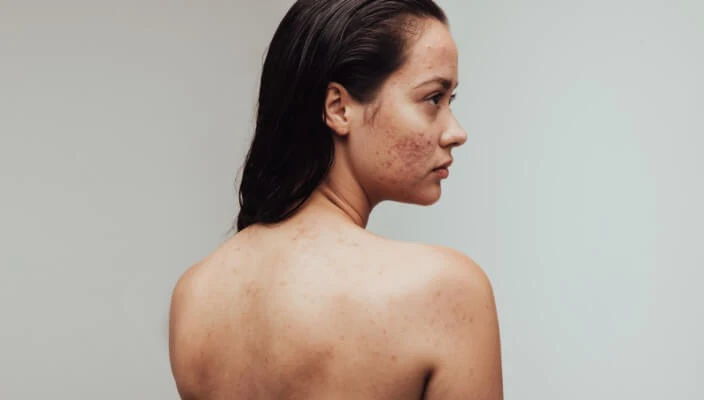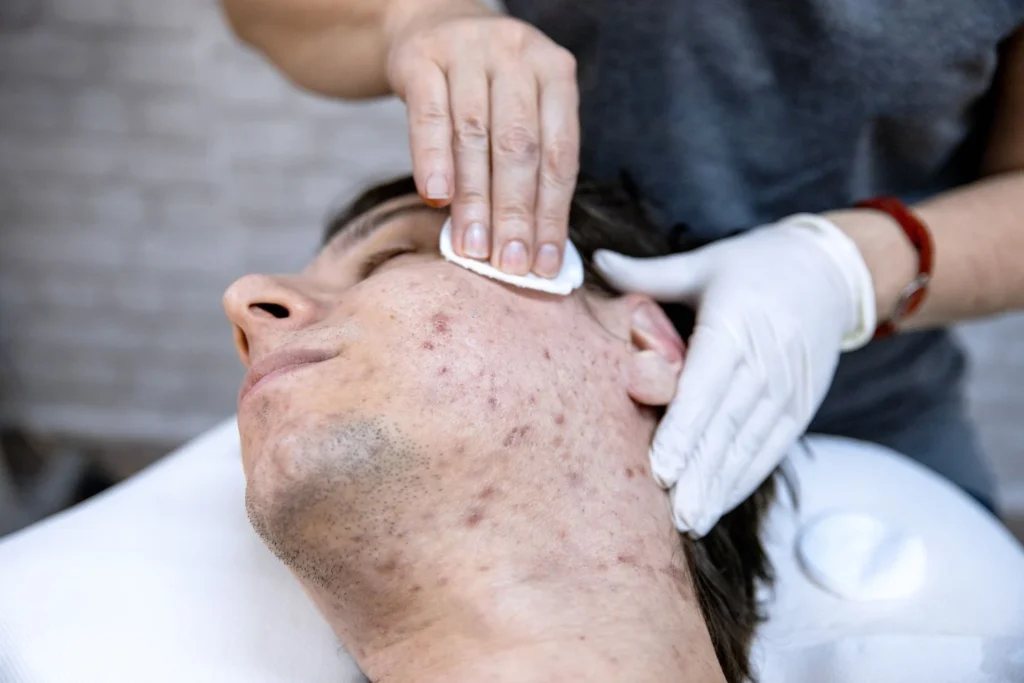What Causes Acne: Understanding, Treating and Preventing
Introduction
Acne is a common skin condition that affects millions of people around the world, regardless of age or gender. Characterized by pimples, blackheads, and whiteheads, acne can not only impact the skin but also leave emotional and psychological effects. The occurrence of acne is mainly due to clogged pores and overactive oil glands, but it is influenced by a variety of factors. Understanding the potential causes, effective treatment options, and preventive measures is crucial in managing this complex skin condition and achieving clearer, healthier skin. This guide delves deep into the reasons behind acne, explores various treatment methods, and provides practical skincare tips to help prevent future breakouts.
Understanding Acne

Definition and Types of Acne
Acne is a common skin condition that manifests as different types of blemishes, which can range from mild to severe. These blemishes include whiteheads, blackheads, pimples, cysts, and nodules. Each type represents a different level of pore blockage. Whiteheads and blackheads, categorized under non-inflammatory acne, result from pores clogged with excess oil and dead skin cells. Pimples, cysts, and nodules, which represent inflammatory acne, develop due to deeper infections in the blocked pores caused by bacteria.
Acne primarily occurs on the face, chest, and back, where sebaceous glands are predominant. The severity and type of acne can vary based on multiple factors, including age, skin type, and environmental exposures. Understanding these types and their causes is essential in adopting appropriate skincare routines and treatments.
Common Misconceptions about Acne
Despite being one of the most prevalent skin conditions globally, numerous misconceptions surround acne. One such misconception is that acne only affects teenagers. In reality, acne can affect individuals of all ages, including infants and adults. Another common myth is that poor hygiene causes acne. While a good skincare regime is essential for health, acne roots more deeply in hormonal imbalances, genetic factors, and other internal conditions rather than merely unclean skin.
Many believe that consuming greasy foods and chocolate exacerbates acne. While diet plays a role in overall skin health, no direct scientific correlation consistently links specific foods to acne outbreaks across all individuals. Understanding that acne results from a combination of factors, rather than a single cause, can help in addressing its root causes more effectively and compassionately.
Causes of Acne
Hormonal Factors
Hormones significantly influence acne development, predominantly during puberty, menstruation, pregnancy, and through conditions such as polycystic ovary syndrome (PCOS). During these times, the body experiences elevated levels of androgens, such as testosterone, which stimulate the sebaceous glands to produce more sebum. Excess sebum can lead to clogged pores, which are the breeding ground for bacteria, thus leading to acne.
For many women, premenstrual fluctuations in hormone levels can lead to acne flare-ups, commonly noticed around the jawline and chin. Similarly, hormonal therapies like birth control pills can either worsen or improve acne conditions, depending on an individual’s response to the hormonal changes it induces. Recognizing the hormonal causes of acne is crucial, as it may dictate specific treatments that include hormonal medications or lifestyle adjustments.
Genetic Predisposition
Genetics play a crucial role in determining who gets acne and how severe it might be. If both parents had acne at some point in their lives, their children are more likely to develop it as well. This predisposition is linked to several genetic factors, including the size and activity level of your sebaceous glands, skin cell turnover rate, and the natural skin barrier function.
Studies highlight that variations in genes associated with immune response can also influence acne severity by determining how your body reacts to acne-causing bacteria. Understanding your genetic predisposition can aid in customizing treatment options, which might require more persistent efforts with specialized approaches than those typically necessary for individuals without a genetic inclination towards acne.
Lifestyle Factors
Lifestyle plays a significant role in the exacerbation or alleviation of acne. Factors such as stress, diet, sleep quality, and skincare habits contribute significantly. Stress increases the production of hormones like cortisol, which can exacerbate acne by intensifying skin inflammation and sebum production. Managing stress through activities like yoga, meditation, and regular exercise can help mitigate these effects.
Diet is another pivotal lifestyle factor, as high glycemic foods (such as sugary snacks and white bread) can spike blood sugar levels rapidly, leading to an increase in insulin. Elevated insulin levels can trigger an androgen response, leading to increased oil production and potential acne flares. Adopting a low-glycemic diet rich in fruits, vegetables, and whole grains can help maintain stable insulin levels.
Sleep quality also impacts hormone production and overall skin health. Establishing a regular sleeping pattern can help regulate hormone levels and aid in skin regeneration.
Finally, appropriate skincare can help manage and prevent acne. It’s crucial to choose non-comedogenic products, which do not clog pores. Regular cleansing and appropriate moisturizing, along with being mindful of the products’ composition, are fundamental steps in maintaining clear skin.
By addressing these lifestyle factors effectively, individuals can see a significant improvement in their acne symptoms, highlighting the importance of a comprehensive approach to acne management that integrates various aspects of health and well-being.
Treating Acne

Acne treatment varies depending on the severity and type of acne. Treatment can include over-the-counter (OTC) products, prescription medications, and professional dermatological procedures. The goal is to reduce oil production, speed up skin cell turnover, fight bacterial infection, and reduce inflammation to prevent scarring.
Dermatological procedures
Dermatological procedures can often provide quicker and more significant results compared to topical treatments, especially for severe acne. These procedures must be performed by a licensed dermatologist and can include:
– Chemical Peels: Using a chemical solution to remove the top layers of skin, which helps clear clogged pores and remove dead skin cells. Peels can also improve the overall skin texture and reduce the appearance of scars.
– Laser Therapy: Targets the deeper layers of skin without harming the surface. Laser therapy can reduce oil gland size and decrease sebum production, which is often a cause of acne.
– Microdermabrasion: Involves physical exfoliation to remove the outermost layer of skin. This process accelerates cell turnover and can improve skin texture and appearance.
– Light Therapy: Exposes the skin to different types of light to target and kill the bacteria that contribute to acne, and reduce inflammation and oil production.
– Corticosteroid Injections: Used to treat inflamed cysts and nodules, injections can quickly reduce swelling and promote healing, but are typically a last resort due to potential side effects.
Each of these procedures has its own set of potential risks and benefits, and selecting the right treatment involves a thorough assessment by a dermatological professional.
Preventing Acne
While treating active acne is crucial, prevention plays a key role in maintaining clear skin long-term. Preventative strategies include proper skincare routines, dietary adjustments, and general lifestyle changes. Prevention is also crucial in avoiding acne scars or worsening of existing conditions
Skincare routine for acne-prone skin
Maintaining a consistent skincare routine can significantly reduce the frequency and severity of breakouts. For acne-prone skin, a routine might include:
Cleanser: Use a gentle, non-comedogenic cleanser to remove dirt, oil, and makeup without harsh irritation. Cleansing twice daily, morning and night, is recommended.
Toner: A good toner can help restore the skin’s pH balance and remove any residual impurities after cleansing.
Exfoliation: Regular exfoliation (once or twice a week) helps to clear the buildup of dead skin cells and prevent clogged pores. It is important to use a gentle exfoliant to avoid irritating the skin.
Moisturizer: Moisturizing is crucial, even for oily skin. Choose oil-free and non-comedogenic moisturizers to hydrate the skin without clogging pores.
Sunscreen: Daily sunscreen application is essential, as sun exposure can exacerbate acne and lead to post-inflammatory hyperpigmentation.
Additionally, using products with active ingredients like benzoyl peroxide, salicylic acid, or alpha-hydroxy acids can help treat and prevent acne by targeting bacteria and clogging, and promoting skin cell turnover.
Dietary recommendations
Research suggests that diet can influence acne, though it affects individuals differently. Consider adopting the following dietary guidelines to help manage and prevent acne:
Reduce high-glycemic foods: Foods that cause a rapid increase in blood sugar, such as white bread, sugary drinks, and pastries, can trigger hormonal fluctuations and inflammation, exacerbating acne symptoms.
Increase fruits and vegetables: These contain vitamins, minerals, and antioxidants that can help fight inflammation and support skin health.
Consider omega-3 fatty acids: Found in fish like salmon and sardines, and flaxseeds, omega-3 fats help control inflammation in the body, which can reduce the redness and swelling associated with acne.
Stay hydrated: Drinking sufficient water each day helps to keep your skin hydrated and promotes detoxification which might contribute to clear skin.
Changing your diet isn’t a guaranteed fix for acne, but it can contribute significantly to your overall skin health and help mitigate some contributing factors of acne.
Healthy lifestyle habits
In addition to skincare and diet, general lifestyle modifications can improve skin health and reduce the likelihood of acne flare-ups:
Regular exercise: Increases blood flow, which helps nourish skin cells and keep them vital. However, it’s important to cleanse your face after sweating to prevent pores from clogging.
Stress management: Chronic stress can worsen acne, stimulate adrenal glands producing more hormones which can increase oil production. Techniques such as yoga, meditation, and adequate sleep can help manage stress.
Avoid touching your face: Hands can transfer dirt and bacteria to your facial skin, which may contribute to breakouts. Try to keep your hands away from your face as much as possible.
Cleanse skin after sweating: Post-workout or after any sweating, gentle cleansing can prevent the buildup of oil and dead skin cells.
Non-comedogenic products: Whether it’s makeup, sunscreen, or skincare, choosing products labeled ‘non-comedogenic’ will ensure they don’t contribute to clogging pores.
Implementing these strategies comprehensively can create an environment conducive to healthier skin and significantly reduce the occurrence of acne. By combining effective treatments, proper skincare, suitable diet, and lifestyle practices, managing and preventing acne becomes more achievable.
Conclusion
Acne, a widespread skin condition, affects millions of people around the globe and varies tremendously in terms of severity and duration. Understanding the causes and mechanisms behind acne is crucial for effective management and treatment. This primarily involves recognizing the role of hormones, bacteria, genetics, and lifestyle factors in the development of acne.
Prevention and treatment strategies should focus on a holistic approach tailored to an individual’s specific skin type and acne triggers. Skincare regimes that include gentle cleansing, appropriate moisturizers, and if necessary, medicated products containing ingredients like benzoyl peroxide or salicylic acid, can be effective in managing acne. It’s also important to maintain a healthy diet and manage stress levels as part of a comprehensive acne prevention strategy.
Even with the vast array of available treatments, patience and persistence are key, as acne can often be stubborn and recurrent. Consulting with dermatologists or skincare professionals can provide personalized advice and treatment options, which might include prescriptions for topical retinoids or antibiotics, hormonal treatments, and, in severe cases, isotretinoin.
Lastly, understanding that acne can significantly affect mental well-being is imperative. Support from family, friends, and professionals can mitigate the psychological impact of this condition. Awareness and education on acne can help reduce stigma and promote a more supportive environment for those affected.
By adhering to these principles and continually educating ourselves about the scientific advances in dermatology, we can all strive toward clearer skin and improved quality of life.